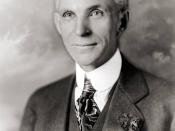McDonalization � PAGE \* MERGEFORMAT �2�
Running Head: SOCIOLOGY: MCDONALIZATION
Sociology: McDonalization
�
Sociology: McDonalization
George Ritzer, drawing upon Weber, calls it the McDonaldization of Society,
"a society in which 'people would move from rationalized educational institutions to rationalized workplaces and from rationalized recreational settings to rationalized homes." (Ritzer, 2003)
Not all would agree with Ritzer. It is said by some that we have seen the back of bureaucratic rationality, for it is a structural arrangement born of the Enlightenment, ill-suited to the post-modern age. The position taken here is that the 'iron cage' of bureaucratic rationality is much to the fore, but at times has a softer appearance. Ritzer allows for this in his analysis. Yet, despite all these rationalizing practices, irrationalities will emerge, for two reasons: first, the ordered structures of bureaucratic rationality may clash with the emerging disorder of post-modernist culture; and second, these means may subvert some of the very ends which they purport to achieve.
Much of this is not new. Nevertheless, the architectural symbolism of McDonalds' golden arches provides considerable food for thought about the form and content of modem systems of higher education. As stated, the principal 'dimensions' at the heart of 'McDonaldization' are fourfold:
"Efficiency; quantification and calculability; predictability, and the substitution of non-human technology for human technology or control." (Ritzer, 2003)
Time, space and people are all managed. In particular, the customer is co-opted into the production process: by queuing to order food; by cleaning up after the meal; by eating with fingers, not utensils; and so on. The drive-in restaurant ensures the maximum degree of impersonality and speed of throughput; and, by getting customers to utilize their own space (the car) on behalf of the restaurant, overheads are reduced. Ritzer gives further examples. In medicine, he points to...


